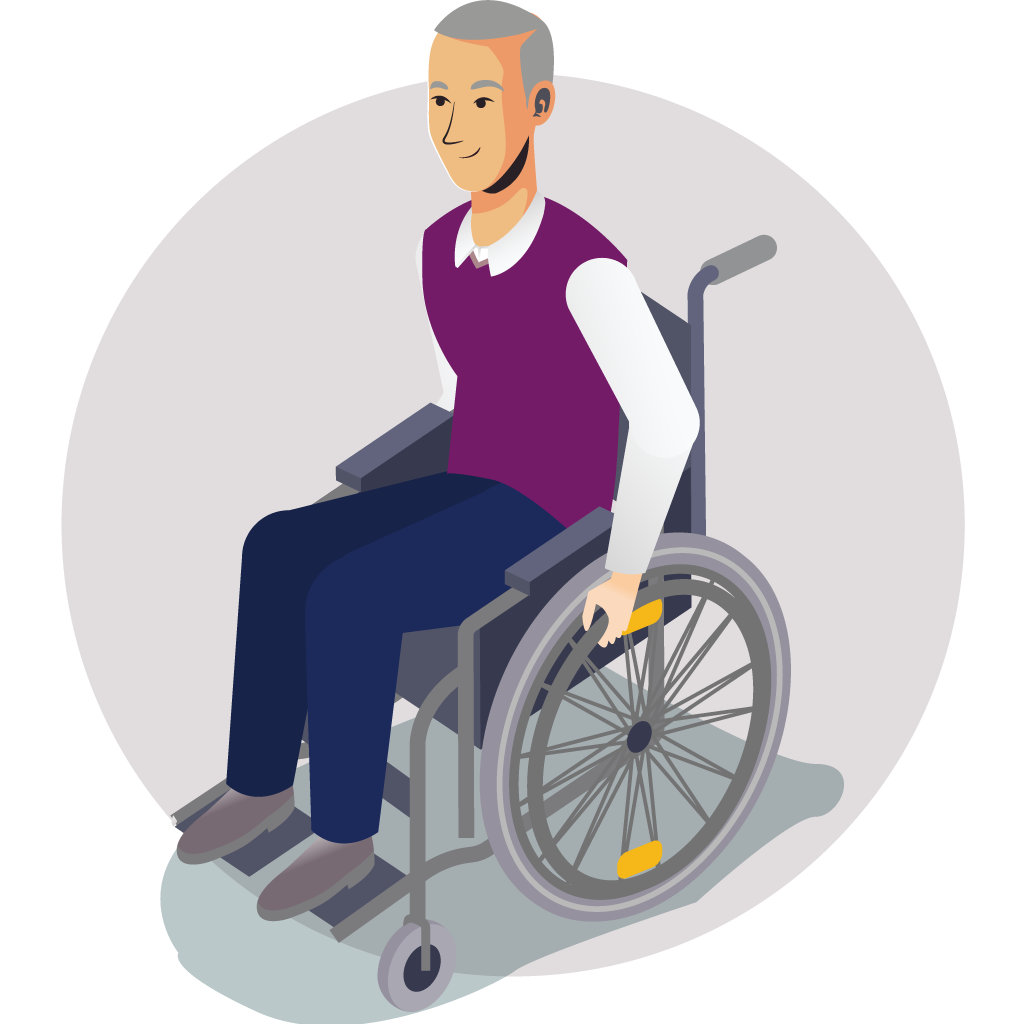Reduced mobility
A pregnant woman, a person with a broken leg, a disabled person or someone with impaired vision: when you’re experiencing reduced mobility, moving around a public space becomes a challenge.
Whether temporary or permanent – there are plenty of instances of reduced mobility. Because getting around is a basic need, continuous efforts aim to ensure people with reduced mobility are able to use public transport without any problems. This involves specially adapted train and bus stations and making sure travellers get all the information they need for their trip. On-board screens and audio announcements keep bus passengers informed about their journey, for example. Also, our website meets the required accessibility standards and can be used by disabled persons.

Equipment and infrastructure

Ministry of Mobility and Public Works, Public Transport Administration
As part of the mLive project, a series of tools makes sure that public transport travel information is accessible to everyone. For instance, screens in RGTR and TICE buses show upcoming stops on the route. Each stop is also signalled by an audio announcement beforehand. Bus timetable displays have been created together with a multi-disciplinary team (Experts Multidisciplinaire en Accessibilité – MEGA) and thus meet the required accessibility criteria.
Moreover, with its brochure titled “Recommendations for bus stop adaptations”, the Administration does its best to assist Luxembourg communes with offering independent access to the bus network to people with reduced mobility. The brochure lists technical accessibility features. These include a tactile guiding system for people with impaired vision and blind persons, as well as bus access for persons with reduced mobility.

CFL
CFL assists people with reduced mobility at both the national and international level. Those in question are asked to notify the CFL at least one hour before travelling. For international journeys and due to agreements between CFL and foreign rail networks, advance notice of 48 hours is required for requests for assistance at foreign stations.

TICE
TICE operates 21 buses with an area designed for and dedicated to disabled persons. It also runs 56 buses that comply with the 2001/85 directive.

City of Luxembourg
All equipped with lowered floors, stop request buttons accessible to everyone and some notices in braille, the Autobus de la Ville de Luxembourg (AVL) fleet is fitted with a number of systems to facilitate safe access for all.

Luxtram
With no step to take between the platform and the carriage, trams are highly accessible to all users, including to persons with reduced mobility, people carrying luggage and people with buggies or bikes. With a width of 2.65 metres, the air-conditioned interior makes moving around very easy.
Buses on demand
Do you suffer from a permanent illness or disability? Do you have no way of getting around, either on your own or with existing public transport options? Special transport schemes are available for occasional trips such as shopping, leisure, medical appointments and the like.
Adapto
Available on demand, Adapto is a free individual transport service for people with an irreversible handicap or a physical, mental, sensory or mental deficiency, with reduced mobility, and for people with a progressive disease having no other possibilities to move.
As part of the introduction of free public transport, Adapto transport is also being reformed with effect from 1 March 2020. The form for obtaining an Adapto card has been modified accordingly. The form is available online. To be able to use transport, a request can be made using this form accompanied by the new medical certificate. If, for a reason beyond their control, holders of an old Adapto card fail to obtain the medical certificate in good time, they can request additional time and receive a temporary Adapto card.
Documents should be sent to the Département des transports, Service Adapto.
Transitional phase for transport beneficiaries before the reform
Persons who have benefited from Adapto transport before 1 March 2020 and who have submitted, or will continue to submit, a request using the new form, receive a new card.
People who do not meet the new conditions, and people who have received a letter of refusal of access following the introduction of their new request, receive a provisional card valid until 31 December 2020.
Bookings
Times: from 7 a.m. to 10 p.m. Sunday (and national holidays) to Thursday/7 a.m. to midnight Friday and Saturday.
To book Adapto transport, call the Mobilitéitszentral on 2465 2465. Transport should be ordered with sufficient notice (at least one working day). You can also book a transport with the Adapto app (available on Google Play and on the App Store).
Call-a-Bus
Call-a-Bus, the on-demand bus service in the City of Luxembourg, is available for city residents aged 70 years or over. It can take you to the destination of your choice, regardless of stops, timetables and bus routes.
To use Call-a-Bus, call 4796-4797 at least 45 minutes before the desired departure time. State the time and place of departure and your destination, both of which must be within the City of Luxembourg. Bookings are accepted from three weeks before the desired date.
Strategies and regulations
The ministry for Mobility and Public Works has developed a plan of action in support of people with reduced mobility. This provides specific measures for short-, medium- and long-term implementation across rail, road and airport networks.
Articles 9 and 20 of the United Nations Convention on the Rights of Persons with Disabilities refer to personal mobility.
The brochure entitled “Accessibility to Public Transport” produced by Info-Handicap provides information, references to legislation (European and national) and contacts in Luxembourg.






